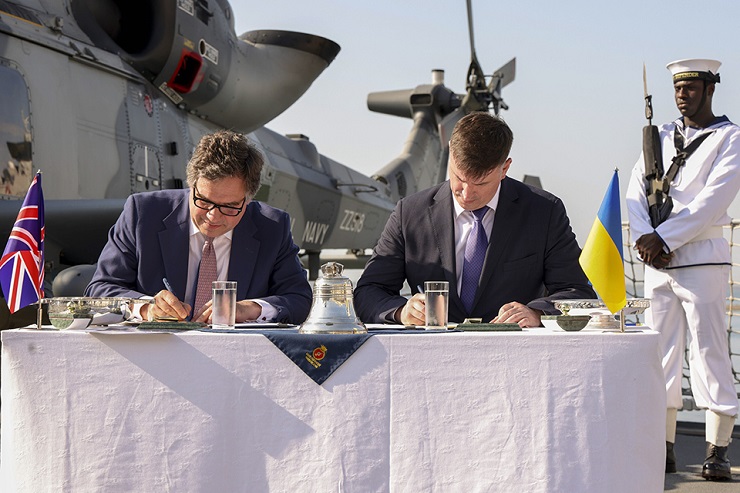In the face of collapsing British policies and actions in the foreign arena, the recent joyful publication of the British authoritative publication The Telegraph brought to attention that London had signed an agreement with the Ukrainian Navy “that will contribute to the development of British shipbuilding.”
As the newspaper points out, a tragicomic situation has developed in Ukraine in recent years. Instead of building up its own ruined national industry, the country would invest in the development of British warship building. This is the way the signing of the agreement on the sale of British missiles to Kiev, the retraining of the Ukrainian Navy, and the joint design and construction of eight warships has been assessed. As a result, the British shipbuilding industry has reportedly benefited from the signing of an agreement with the Ukrainian Navy. This agreement outlines, among other things, plans for cooperation with Babcock to provide Ukraine with new frigates and port facilities. In addition, Britain will sell Ukraine two Sandown-class minesweepers after they are repaired and will help it build new naval bases. According to military sources, at least two of the eight missile boats Ukraine plans to receive will be built by Babcock before “technology transfer” allows that country to launch its own production.
In the published official report of the British authorities, it is indicated that, in a trilateral agreement signed on board the destroyer Defender, which was in Odessa as part of the deployment of the strike aircraft carrier group, Britain, Ukraine and the military-industrial complex have agreed to cooperate in the work to strengthen the naval potential of Ukraine.
So who is helping who? Is Ukraine helping Britain, or vice versa? And is it possible to distinguish the truth from the propaganda campaign actively used by London to popularize its policies?
As it turned out, Britain is selling six missile boats and two outdated Sandown minesweepers to Ukraine. This purchase will be made on account of a £1.25 billion ($1.7 billion) loan allocated to Kiev. The profit of the British side will be even greater, as it will be able to save considerable funds, which otherwise would have to be spent on the disposal of the ships. In addition, in the future, the British will also make a profit on the modernization of obsolete ships, similar to how Estonia had to pay £35 million in 2016 for the modernization of three minesweepers of the same Sandown class.
This information was confirmed by the announcement of the press service of the British Admiralty on August 4 that Britain will “transfer” to Ukraine two decommissioned after many years of service in the British Royal Navy mine protection ships of the Sandown class – HMS Blyth and HMS Ramsey. Both ships defended British interests at sea for quite a long while: Ramsey served 21 years with 175,000 miles on the seas, and Blyth served 20 years with 185,000 miles. These minesweepers participated in operations in the Middle East and served in NATO campaigns in Northern European and Mediterranean waters. They were the first to be sent to Bahrain when British authorities decided that a permanent anti-mine ship presence was required in the Persian Gulf (which remains the case to this day).
These decommissioned ships, under the Royal Navy’s Project Wilton rearmament program, will be replaced by autonomous drones and mine-hunting systems.
In addition, on July 7, the Ukrainian Cabinet of Ministers announced the allocation of funds for the purchase of another icebreaker for Antarctic expeditions and research of the World Ocean from that same Britain – a former veteran flagship of the British Antarctic service James Clark Ross. London has agreed to sell it to Kiev for $5,304,000 with a starting price of $10 million. As reported by the British Embassy in Ukraine on its Facebook page, the icebreaker served as part of the British Antarctic mission for 30 years. In 1996 it was James Clark Ross that delivered the first Ukrainian mission to the former British Antarctic Faraday station, British diplomats recalled in a supplement, which the same year was handed over by London to the Ukrainians and renamed by Kiev the Akademik Vernadsky station.
Thus, London, thanks to intensified cooperation with Kiev in the shipbuilding field, enjoys a nice benefit from Ukraine – recycling of its assorted junk, with a good premium to boot. It certainly makes clear what The Telegraph says about promoting British shipbuilding through “profitable cooperation with Ukraine” and the proceeds for London to build and upgrade the Royal Navy’s fleet.
However, Kiev should hardly be happy about this “cooperation,” as the interactions with British suppliers rarely seem to work out well for Ukraine. Thus, three years ago, the British company Rolls-Royce refused to sell to Kiev components for the Ukrainian airborne assault boats “Kentavr” five days before delivery, citing the lack of permission to supply dual-use goods. Yuri Biryukov, a former advisor to former Ukrainian President Petro Poroshenko, recently told about this on his Facebook page. According to some observers, it cannot be ruled out that by taking this step Britain was clearly afraid to sell components because the Ukrainian fleet might suddenly become “indestructible” and even take away from London the former title of the British Empire – the “Queen of the Seas”.
To summarize, it is unfortunate that Ukraine inherited from the USSR the most powerful shipbuilding and space facilities, which it then destroyed, and instead is content with handouts in the form of used junk from its new “brothers.” It is even more unfortunate that this is perceived by the public with utterly genuine menial enthusiasm.
Vladimir Danilov, political observer, exclusively for the online magazine “New Eastern Outlook”.
